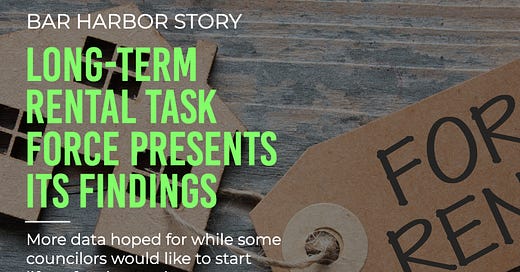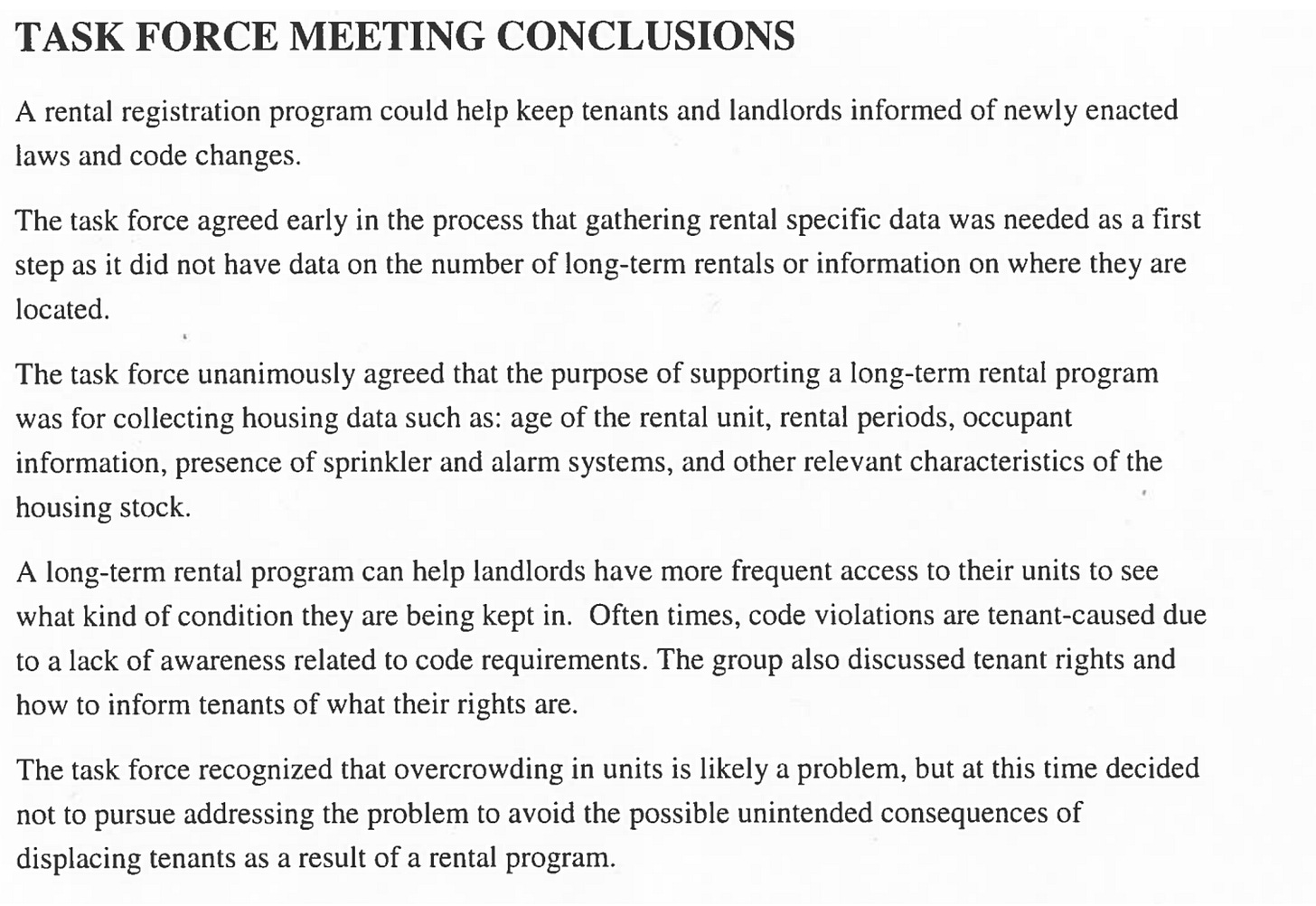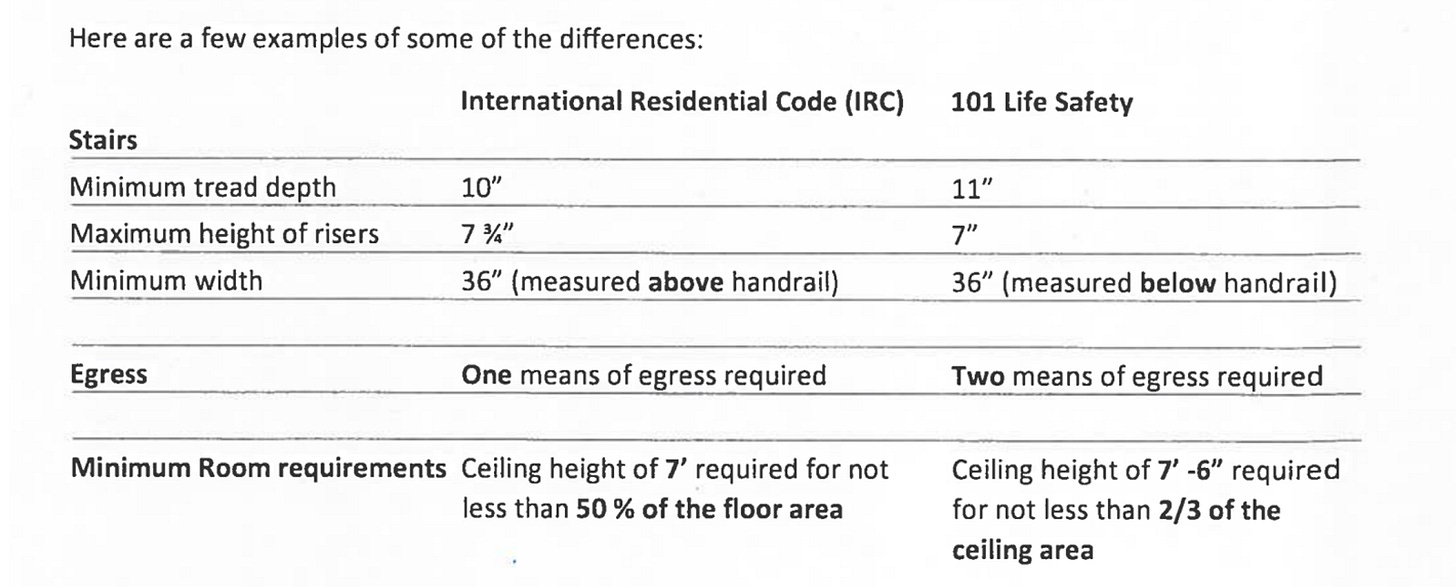Long-term Rental Task Force Presents Its Findings
More data hoped for while some councilors would like to start life-safety inspections soon
Could long-term rental owners be impacted by a ‘failure to register fee” for not registering their rental units? Possibly, but it’s still up in the air as a new town task force continues to gather data prior to making official recommendations and requirements for inspections of long-term rental units.
In its report, the Long-Term Rental Task Force presented a potential recommendation for an incremental fee for landlords of long-term units who do not register their properties, which (if it becomes an official recommendation and is approved by the Bar Harbor Town Council) could start as soon as 2023. Courtesy inspections, workshops, and trainings for landlords and tenants, checklists for landlords and tenants to self-check for issues in the units were also some possibilities proposed by the new task force.
Currently only vacation rentals, employee living quarters and shared accommodations are inspected and regulated. Long-term rentals are not. The hope is that inspection will make housing safe for all, but also “level the playing field for all types of housing units,” Code Enforcement Officer Angela Chamberlain and Fire Chief Matt Bartlett wrote in a September 23, 2021 memo to the town manager (then Cornell Knight) and Planning Director, Michele Gagnon. In the task force recommendations presented to the Town Council during its August 2 meeting, Chamberlain said that the inspections proposed for long-term rentals would not be as “intensive” as some other types of rental inspections.
That was one of many recommendations the Long-Term Rental Task Force’s report made when it was presented at the Bar Harbor Town Council’s regular Tuesday night council meeting. Chamberlain said the task force would like to collect data and then meet again to tweak recommendations.
“The first step and most needed step is that registration process,” Chief Bartlett told councilors.
TASK FORCE’S GOALS
The task force formed at the request of Chamberlain and Bartlett. Chamberlain told the Mount Desert Islander’s Faith DeAmbrose that the duo had been hoping to create a task force for years and “added that while the town does not receive many complaints from tenants or landlords, she often hears from neighbors that there are problems the town has few tools to address,” such as overcrowding. Town ordinance stipulates that up to five unrelated people can reside in one dwelling unit.
“Our goal is not to displace people or be overly burdensome,” Chamberlain said.
“We’re trying to find the balance where it’s beneficial for the landlord and the renters,” Bartlett said.
The potential failure-to-register fee program would apply to HUD housing, on-campus dorms, shared accommodations, transient accommodations, short-term rentals, nursing homes, convalescent housing, congregate housing and employee living quarters.
Another main goal of the task force is to create a “registry of long-term rentals that require registration and relevant associated data to assist the town in understanding the characteristic of the existing housing stock.” To encourage that is why they want to create a free registration application with a fee that increases incrementally when landlords fail to register. On that form would be various questions about the unit’s sprinkler systems, alarms, occupants, rental length, location and more.
The membership includes Bartlett and Chamberlain as well as Bar Harbor Planning Director Michele Gagnon; landlords Todd Hardy and Erica Brooks; Town Councilor Joe Minutolo; residents Jennifer Richardson and Philip Galperin; tenants Heidi Hambrecht and Amber Howard; and John Mountford from the MDI and Ellsworth Housing Authorities
INFORMATION GATHERING AND CONCLUSIONS
Since it began meeting this past January, the task force began to gather information to recommend things like the registration process for long-term rentals, inspection checklist, frequency of inspections, fees and housing exceptions.
The task force’s conclusions are presented in the report and include:
The task force also agrees that “if inspections were eventually implemented into the program, they should not be as intensive as those for the short-term rental registration.” Instead the suggested those inspections should only focus on protecting lives, so things like smoke detectors, carbon monoxide detectors, interior elements that are meant to prohibit or decrease the spread of fire, and egress that is useable.
“The biggest obstacle we faced was the lack of specific data to help us make specific recommendations,” Chamberlain said.
However, it also stated it needed more data to make an inspection recommendation. The group does not currently know how old long-term rental units are or even how many are in Bar Harbor.
Councilor Matthew Hochman said he was concerned about holding off on the inspections when it was so important to keep people safe, and asked why wait for inspections when he thought the goal was to make sure that systematic inspections maintained housing stock and kept renters living in safe conditions.
“I don’t think it needs to be as intensive as what we do for our short-terms,” Hochman said, referencing the report, but agreed with focusing on the three main areas. He added that he’s concerned with only-courtesy inspections because he worries that the people requesting them would likely be the people who are confident in the safety of the units and possibly not the people who actually need the inspections to ensure the safety of the dwellings.
Bartlett said that they need the data to drive the inspection program going forward and understand staffing and time needs.
Councilor Erin Cough said that providing tenants with information about their rights was a huge piece of what she’d like to see, and asked if the information the task force would collect would involve rent, age of building, square footage of the units. She also said she assumed the long-term rentals would adhere to the IRC, referencing what short-term rentals are required to adhere to.
Chamberlain said long-term rentals didn’t necessarily have to adhere to the same requirements and that the question for long-term rental inspections might be “is it a reasonable means of egress that someone could escape from in an emergency,” which would be more flexible than the short-term rental inspection rules. She said she wasn’t sure what they’d use for code regulations.
Cough said, “Well, this is a really good argument for making them all consistent.”
POLCO COMMENTS
During the task force’s tenure, the town also solicited opinion from residents via PolCo, an online survey site. Some of those results are as follows:
Residents also had the opportunity to comment. Chamberlain said the comments were across both sides of the issue. Some respondents worried that if rentals are inspected and not found up-to-code, landlords might balk at the cost of upgrades and instead evict tenants, or they could raise rents.
“This is a double-edged sword,” one anonymous respondent wrote, “and may have more negative impacts than positive. Let’s recognize the elephant in the room: overcrowded seasonal employee housing.”
Another wrote, “This needs to stop. You are not helping but killing long-term rentals. Stay the expletive outta stuff you should not be in. Like long and short-term rentals.”
SHORT TERM RENTALS AND TINY HOUSES
Also on the council agenda were potential amendments to Chapter 174 of the town’s municipal code. This chapter stipulates life safety inspections and timing for short-term rental registrations.
Chamberlain said she was looking for direction and said that some of the short-term rentals now require massive renovations to meet the code requirements.
She wrote, “Now that short-term rentals require inspections on a three-year cycle, we are working to ensure that our inspection requirements are clear, concise, and consistently applied. When the town first implemented the short-term regulations and inspections in 2006, we adopted the NFPA 101 Life Safety code requirements for short-term rental inspections.”
The language in the ordinance doesn’t give us flexibility, she said.
Chamberlain also asked for guidance about the town code as it pertains to tiny houses because though the town has adopted an appendix about tiny houses, which would allow them to be constructed, some of the code’s exceptions “do not meet the STR (short-term rental) language as it currently exists, or as I am proposing it.”
Bartlett said there have been concerns in regards to the safeness of tiny houses, the use of ladders to lofts during emergency response and decreased sizes in sleeping areas when it comes to headroom space, saying this increases the difficulty for emergency responders.
“They provide pretty significant challenges to us,” Bartlett told the council. In some spaces he said, there is barely room for a bed and then if you bring in multiple responders, there’s not enough room to provide medical services and if ladders are involved, firefighters might have to cut through roofs.
WANT TO LEARN MORE?
To access all the comments and the full report, head to the town council packet for August 2, 2022.
Bar Harbor’s code enforcement office has a ton of good information about short-term rentals, the rules and inspections required, here, and also the long-term rental program and task force here, including the PolCo summaries.
Full Disclosure:
This writer owns a home that is currently used for a weekly rental, which provides a significant portion of her income and allows her to be a writer.









